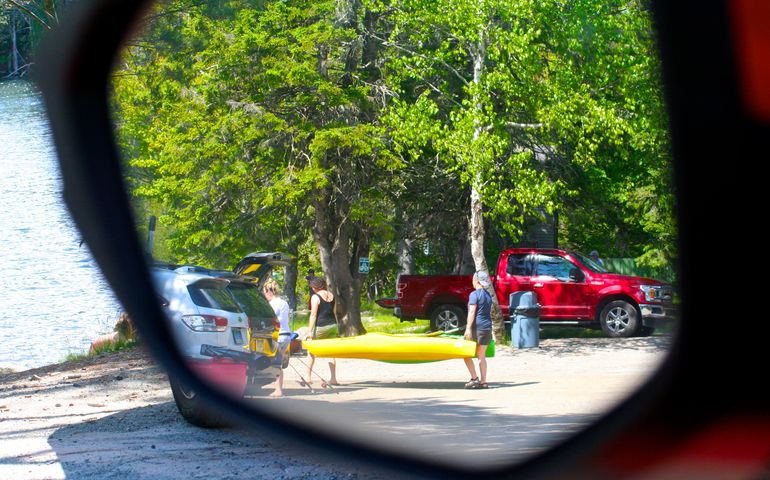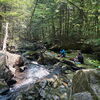Processing Your Payment
Please do not leave this page until complete. This can take a few moments.
- News
-
Editions
View Digital Editions
Biweekly Issues
- December 1, 2025
- Nov. 17, 2025
- November 03, 2025
- October 20, 2025
- October 6, 2025
- September 22, 2025
- + More
Special Editions
- Lists
- Viewpoints
-
Our Events
Event Info
Award Honorees
- Calendar
- Biz Marketplace
UMaine researchers, MDI tourism partners work to identify climate change effects
 Photo / Laurie Schreiber
Paddlers carry their boat to the water at a popular kayaking spot in the town of Mount Desert. New research shows tourism providers view warming temperatures as a possible benefit with future risks.
Photo / Laurie Schreiber
Paddlers carry their boat to the water at a popular kayaking spot in the town of Mount Desert. New research shows tourism providers view warming temperatures as a possible benefit with future risks.
Some tourism experts on Mount Desert Island say increasing temperatures might bring more visitors and benefit coastal Maine's economies.
But increased temperatures might reach a tipping point where the climate becomes too warm and less attractive to visitors seeking a cooler destination, according to a new study from the University of Maine.
The study convened tourism developers and academics on Mount Desert Island to identify climate change effects and determine what can be done to address them given a community’s strengths, limitations and resources.
“MDI tourism professionals are very aware of climate change impacts to their businesses and the resources they manage,” said Lydia Horne, lead author of the study who completed the research as a UMaine Ph.D. candidate.
UMaine researchers worked with tourism partners on Mount Desert Island to identify the various effects of climate change in the area’s tourism system and develop planning priorities for the area. The approach brought together diverse tourism suppliers who do not often collaborate, alongside climate change planners, natural resource managers and other academic researchers.
The group identified climate-change impacts such as increasing heat and temperature, decrease in snowpack, changes to flora and fauna, increase in ticks and the unpredictability of extreme weather events.
Participants created planning priorities based on the impacts they observed. Two items rose to the top: addressing increased visitation and making Mount Desert Island a more sustainable tourist destination through energy and transportation strategies that reduce greenhouse gas emissions.
Participants then identified actions they could take to work toward these goals, such as shifting the timing of activities and product offerings to adapt to shifting visitation patterns as well as improving winter safety messaging and tourism infrastructure in response to increased winter visitation.
The study used a process called “participatory planning,” which brings together a variety of stakeholders to analyze complex issues by applying local knowledge. The approach has been used to assess climate change impacts elsewhere in the world.
For example, a 2014 study engaged municipal officials, tourism developers, business owners and researchers in northern Finland to identify climate change impacts and adaptation measures for two tourism areas.
“A participatory approach allows researchers to center that expertise and experience to help develop locally relevant solutions that consider existing resources, including existing partnerships and ongoing adaptation and mitigation projects,” said Horne.
“It was apparent these conversations with coastal communities need to happen more regularly to find both short- and long-term feasible solutions,” said Valeria Briones, a study co-author who also conducted the research for her master’s degree in forest resources.
“Many climate projections are on a 50- to 100-year time scale, which are important for long-term planning, but may not necessarily address the immediate concerns and rapid changes that impact the tourism industry face from year to year.”
The project was driven by graduate students, led by Horne, Briones, Alyssa Soucy, a Ph.D. candidate in ecology and environmental sciences; Gabriela Wolf-Gonzalez, who participated for her master’s degree in ecology and environmental sciences; and Asha DiMatteo-LePape, who participated for her master’s degree in forest resources.
The students were advised by Sandra De Urioste-Stone, associate professor of nature-based tourism in the School of Forest Resources, and are part of the National Science Foundation Research Traineeship program that seeks to train the next generation of transdisciplinary conservation leaders.
To view the study, published in the journal Tourism and Hospitality Research, click here.
Mainebiz web partners
Related Content

The Giving Guide
The Giving Guide helps nonprofits have the opportunity to showcase and differentiate their organizations so that businesses better understand how they can contribute to a nonprofit’s mission and work.
Learn More
Work for ME
Work for ME is a workforce development tool to help Maine’s employers target Maine’s emerging workforce. Work for ME highlights each industry, its impact on Maine’s economy, the jobs available to entry-level workers, the training and education needed to get a career started.
Learn More
Groundbreaking Maine
Whether you’re a developer, financer, architect, or industry enthusiast, Groundbreaking Maine is crafted to be your go-to source for valuable insights in Maine’s real estate and construction community.
Learn more-
The Giving Guide
The Giving Guide helps nonprofits have the opportunity to showcase and differentiate their organizations so that businesses better understand how they can contribute to a nonprofit’s mission and work.
-
Work for ME
Work for ME is a workforce development tool to help Maine’s employers target Maine’s emerging workforce. Work for ME highlights each industry, its impact on Maine’s economy, the jobs available to entry-level workers, the training and education needed to get a career started.
-
Groundbreaking Maine
Whether you’re a developer, financer, architect, or industry enthusiast, Groundbreaking Maine is crafted to be your go-to source for valuable insights in Maine’s real estate and construction community.
ABOUT
NEW ENGLAND BUSINESS MEDIA SITES
No articles left
Get access now
In order to use this feature, we need some information from you. You can also login or register for a free account.
By clicking submit you are agreeing to our cookie usage and Privacy Policy
Already have an account? Login
Already have an account? Login
Want to create an account? Register
Get access now
In order to use this feature, we need some information from you. You can also login or register for a free account.
By clicking submit you are agreeing to our cookie usage and Privacy Policy
Already have an account? Login
Already have an account? Login
Want to create an account? Register










0 Comments